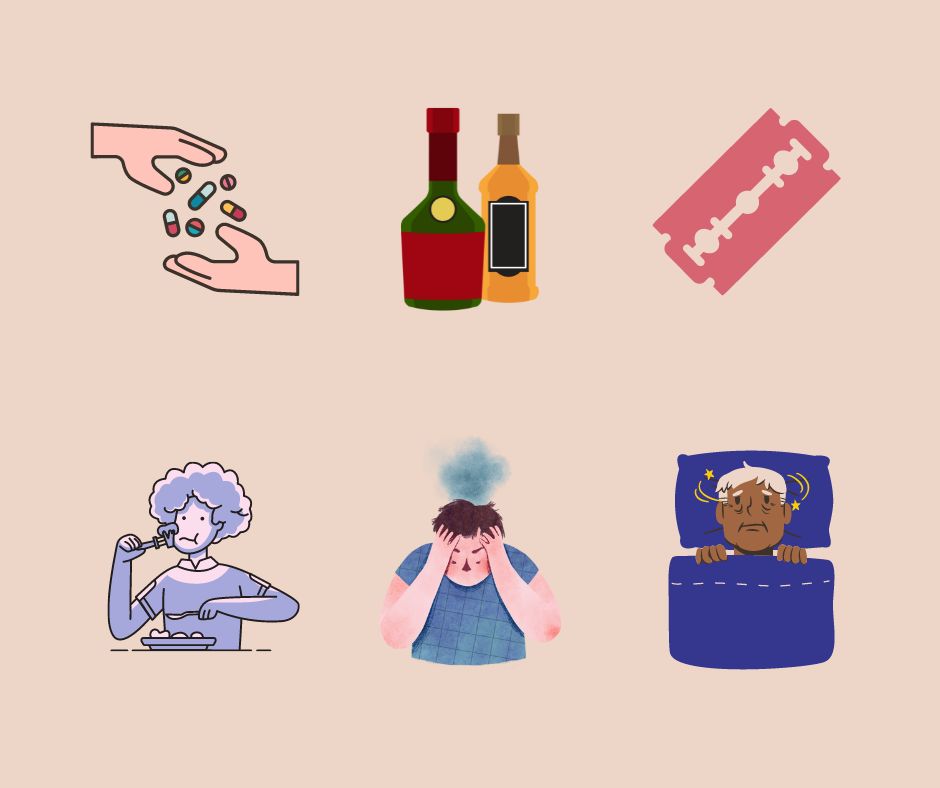Article Contents
In the tapestry of human existence, the intricacies of the mind and emotions become fascinating as we age. As the years pass, older adults face unique challenges that can affect their mental and emotional well-being. Welcome to the captivating realm of senior behavioral health.
In this blog, we embark on a journey of discovery, shedding light on the causes, common disorders, and the distinct differences between senior behavioral health and mental illness. Together, let’s unravel the mysteries that shape the inner lives of our seniors.
Join us on this enlightening adventure as we unlock the secrets of aging minds, weaving together knowledge, empathy, and compassion.
What is senior behavioral health?
Senior behavioral health, also known as geriatric behavioral health, is a distinct field within healthcare dedicated to promoting the mental and psychological well-being of older adults. It acknowledges the significance of understanding how behaviors, thoughts, emotions, and mental health intertwine and impact each other.
The concept of behavioral health centers around specific actions or behaviors that impact an individual’s mental and physical well-being. For instance, if an elderly person maintains an inadequate nighttime routine with poor sleep hygiene, they may develop sleep disorders, leading to feelings of drowsiness or irritability. However, it is important to recognize that often a person’s mental health condition contributes to the manifestation of certain behaviors.
Behavioral health vs mental health: What is the difference?
Behavioral health and mental health are interconnected but separate concepts within the field of healthcare. While they share common elements, they have distinct focuses and scopes. The following table highlights the key differences between behavioral health vs mental health:
Mental health | Behavioral health |
1. Refers to a person’s emotional, psychological, and social well-being. | 1. Refers to the relationship between behaviors and overall health, including mental health. |
2. Components of mental health include identity, personality, ethics, emotions, cognitive health, etc. | 2. Components of behavioral health include lifestyle choices, habits, reaction to actions, interaction with people, etc. |
3. Focuses on psychological sensations, thoughts, and feelings. | 3. Focuses on specific actions and behaviors. |
4. Mental health is one of the components of behavioral health. | 4. Behavioral health may not always involve mental health. |
5. Examples: Depression, anxiety, schizophrenia, etc. | 5. Examples: Sleep deprivation, eating disorder, substance abuse, etc. |
Behavioral health vs mental health
Common behavioral disorders in older adults
In older adults, several common behavioral disorders can arise, often associated with age-related changes, underlying health conditions, or psychosocial factors. Here are some examples:
1. Substance abuse
Substance abuse or misuse can affect older adults, particularly when it comes to prescription medications, alcohol, or illicit drugs. Older adults may face challenges with medication adherence, self-medication, or the misuse of painkillers or sedatives. Substance use disorders can have serious health consequences and impact overall well-being.
2. Self-harming tendencies
Self-harm is deliberate self-injury without suicidal intent. Though more common among younger populations, older adults may engage in self-harming tendencies to cope with emotional distress or communicate their distress. Risk factors include a history of self-harm, mental health conditions, social isolation, or physical health issues.
3. Eating disorders
Another behavioral disorder in older adults could be eating disorders. Seniors may develop or continue to struggle with issues such as anorexia nervosa, bulimia nervosa, or binge eating disorder. These issues can be influenced by factors such as body image concerns, societal pressure, underlying psychological issues, or changes in physical health.
4. Sleep disorders
Sleep disturbances are common among older adults, such as disruptions in sleep patterns, insomnia or sleep apnea. Sleep disorders can contribute to daytime fatigue, irritability, and difficulties with concentration. Changes in sleep architecture, lack of sleep aids, and underlying health conditions can increase the risk of sleep disturbances.
5. Late-life psychosis
Psychotic disorders, such as late-life schizophrenia or delusional disorders, can occur in older adults. These conditions may involve hallucinations, delusions, disorganized thinking, and difficulties with social functioning. Late-life psychosis often requires careful assessment and management by mental health professionals.

Common behavioral disorders in older adults
What are the causes of behavioral disorders in seniors?
The causes of behavioral disorders in seniors can be multifactorial, involving a combination of biological, psychological, and social factors. Here are some common causes and contributing factors:
1. Biological factors
Age-related changes in the brain can escalate the development of behavioral disorders in seniors. Neurological conditions such as dementia, Alzheimer’s disease, or Parkinson’s disease can lead to behavioral changes. Additionally, underlying health conditions, hormonal imbalances, or medication side effects can impact behavior.
2. Psychosocial factors
Psychosocial elements play a crucial role in the progress of behavioral disorders in seniors. Life transitions, such as retirement, loss of a loved one, or social isolation, can trigger emotional distress and behavioral changes. Loneliness, lack of social support, or limited engagement in meaningful activities can also contribute to behavioral issues.
3. Cognitive decline
Cognitive decline associated with conditions like dementia or Alzheimer’s disease can lead to behavioral changes. As cognitive abilities decline, seniors may experience confusion, frustration, and agitation, which can manifest as behavioral symptoms. Changes in memory, perception, and problem-solving abilities can impact behavior and emotional regulation.
4. Chronic health conditions
Seniors with chronic health conditions, such as chronic pain, cardiovascular disease, or diabetes, may experience behavioral changes due to the physical and psychological burden of these conditions. Chronic pain, in particular, can contribute to irritability, mood disturbances, and sleep disruptions that affect behavior.
5. Medication side effects
The use of multiple medications, known as polypharmacy, is common among older adults. Certain medications, including those prescribed for pain, sleep, or mental health conditions, can have side effects that impact behavior. Medication interactions or incorrect dosages can also contribute to behavioral changes.
How to regulate senior behavioral health?
Treating senior behavioral health involves a comprehensive approach that considers the specific mental and emotional needs of older adults. Here are some strategies and interventions commonly used in regulating senior behavioral health:
- Medication management: Prescribe appropriate medications for mental health disorders, monitored by a geriatric psychiatrist or mental health professional.
- Psychotherapy: Utilize talk therapy tailored to the needs of older adults to explore feelings, develop coping strategies, and improve mental well-being.
- Supportive counseling: Provide emotional support, psychoeducation, and guidance through counseling services.
- Group therapy: Offer supportive group environments for seniors to share experiences, learn from others, and develop coping skills.
- Cognitive stimulation: Engage seniors in activities that challenge cognitive abilities to maintain mental functioning.
- Lifestyle interventions: Encourage healthy habits, such as exercise, balanced diet, sleep, and social engagement.
- Adapt healthy coping mechanism: Incorporate healthy coping strategies such as yoga, meditation, music, or doing small acts of kindness.
- Caregiver support: Provide support and education to caregivers to better assist seniors with behavioral health issues.
- Case management: Coordinate care between healthcare providers, mental health professionals, and community resources.
- Monitoring and follow-up: Regularly assess treatment progress, make adjustments, and prevent relapse through ongoing monitoring and follow-up.
Senior living behavioral health
Senior living behavioral health programs provide specialized mental health services within senior living communities such as assisted living or nursing homes. They include mental health assessments, individualized treatment plans, therapy and counseling, medication management, behavioral interventions, life enrichment activities, caregiver and family support, care coordination, and ongoing monitoring and evaluation.
Many senior living facilities have dedicated behavioral health units or specialized wings that cater specifically to residents with behavioral health needs. These units are designed to provide a structured and supportive environment for seniors who require more intensive mental health care.
What are the common behavioral health professions?
There are several common behavioral health professions that play a vital role in providing mental health care and support. Some of these professions include:
1. Psychiatrist
A medical doctor specialized in the diagnosis, treatment, and management of mental health disorders. Psychiatrists can prescribe medications and provide therapy.
2. Psychologist
A professional who assesses, diagnoses, and treats mental health disorders using various psychotherapeutic approaches. Psychologists usually hold a doctoral degree in psychology.
3. Licensed clinical social worker (LCSW)
These professionals are trained in providing therapy and support to individuals, families, and groups. They help clients navigate social and emotional issues and connect them with community resources.
4. Licensed professional counselor (LPC)
Counselors offer talk therapy and support to individuals, couples, and families. They help clients develop coping strategies, manage emotions, and improve their overall mental well-being.
5. Psychiatric nurse practitioner (PMHNP)
These advanced practice nurses specialize in mental health care and can diagnose and treat mental health disorders. They often provide therapy and prescribe medications.
6. Marriage and family therapist (MFT)
These professionals focus on providing therapy to couples and families, addressing relationship issues, communication problems, and family dynamics.
7. Substance abuse counselor
These counselors specialize in helping individuals struggling with substance abuse and addiction. They provide counseling, support, and guidance in recovery.
8. Art therapist
Art therapists use creative processes and artistic expression to help individuals explore and address emotional and psychological challenges.
9. Occupational therapist
Occupational therapists assist individuals in regaining or developing skills required for daily living and meaningful activities. They often work with individuals facing mental health challenges.
Final thoughts
In conclusion, senior behavioral health is an incredibly essential and often overlooked aspect of overall well-being in older adults. As we age, it’s crucial to recognize that mental and emotional health can significantly impact our quality of life. Whether it’s addressing self-harming tendencies, eating disorders, sleep disorders, or other behavioral challenges, we must prioritize the holistic care of our elderly loved ones.
We hope that this discussion has shed light on the importance of recognizing and regulating behavioral issues in older adults. Together, we can ensure that our beloved seniors receive the support they need to live fulfilling lives and enjoy their golden years with dignity and happiness.
FAQs
What is a senior behavioral health unit?
A senior behavioral health unit in assisted living or within a hospital is a specialized facility that provides mental health care services to older adults. The unit has a multidisciplinary team of healthcare professionals who offer comprehensive care, including medication management, therapy, and support for daily activities.
Is ADHD a behavioral disorder?
Yes, ADHD (Attention-Deficit/Hyperactivity Disorder) is considered a behavioral disorder. It is a neurodevelopmental disorder that predominantly affects children but can persist into adulthood. The behavioral symptoms of ADHD can manifest in various ways, including difficulty paying attention, being easily distracted, forgetfulness, impulsivity, restlessness, and difficulty staying still or engaging in quiet activities.

